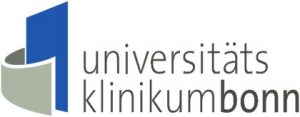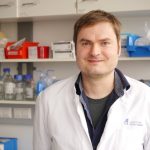
University Hospital Bonn
ILCs and systemic immune activation in HIV infection
Antiretroviral therapy (ART) is highly effective in blocking replication of the human immunodeficiency virus (HIV) and in preventing progression to AIDS. However, there is clear evidence indicating that control of HIV replication does not fully restore human health, with patients on ART still displaying shorter life expectancy due to increased risks for non-AIDS associated morbidities.
Chronic systemic inflammation, characterized by an increased frequency of activated T and B cells, is considered to play an important role in this context. Accordingly, activation of circulating lymphocytes has been shown to be a better predictor for disease progression than HIV plasma load. Of note, markers of immune activation have been shown to be associated with plasma levels of microbial products in HIV infection. Thus, increased levels of circulating microbial products, resulting from microbial translocation, have been proposed to represent a major cause of HIV-induced systemic inflammation. Further studies suggested microbial translocation and systemic inflammation as direct consequences of HIV-associated damage to the gut epithelial barrier.
Recent work of our group indicates HIV-induced alterations of the intestinal ILC pool to be involved in these processes. In current studies we analyse how HIV infection affects compartment-specific composition and function of the intestinal ILC pool and aim at clarifying how these alterations might contribute to systemic immune activation in HIV patients under antiretroviral therapy.

Prof. Dr. Jacob Nattermann
Project Leader

Dr. Benjamin Krämer
Postdoc

Jan Raabe
PhD student
Publications
Krämer B, Goeser F, Lutz P, Glässner A, Boesecke C, Schwarze-Zander C,
Kaczmarek D, Nischalke HD, Branchi V, Manekeller S, Hüneburg R, van Bremen T,
Weismüller T, Strassburg CP, Rockstroh JK, Spengler U, Nattermann J.
Compartment-specific distribution of human intestinal innate lymphoid cells is
altered in HIV patients under effective therapy. PLoS Pathog. 2017 May
15;13(5):e1006373. doi: 10.1371/journal.ppat.1006373. eCollection 2017 May.
PubMed PMID: 28505204; PubMed Central PMCID: PMC5444854.
Goeser F, Glässner A, Kokordelis P, Wolter F, Lutz P, Kaczmarek DJ,
Schwarze-Zander C, Boesecke C, Strassburg CP, Rockstroh JK, Spengler U, Krämer B,
Nattermann J. HIV mono-infection is associated with an impaired anti-hepatitis C
virus activity of natural killer cells. AIDS. 2016 Jan 28;30(3):355-63. doi:
10.1097/QAD.0000000000000963. PubMed PMID: 26558728.
Wolter F, Glässner A, Krämer B, Kokordelis P, Finnemann C, Kaczmarek DJ,
Goeser F, Lutz P, Nischalke HD, Strassburg CP, Spengler U, Nattermann J. Hypoxia
impairs anti-viral activity of natural killer (NK) cells but has little effect on
anti-fibrotic NK cell functions in hepatitis C virus infection. J Hepatol. 2015
Dec;63(6):1334-44. doi: 10.1016/j.jhep.2015.08.008. Epub 2015 Aug 20. PubMed
PMID: 26297916.
Kokordelis P, Krämer B, Boesecke C, Voigt E, Ingiliz P, Glässner A, Wolter F,
Srassburg CP, Spengler U, Rockstroh JK, Nattermann J. CD3(+)CD56(+) Natural
Killer-Like T Cells Display Anti-HCV Activity but Are Functionally Impaired in
HIV(+) Patients With Acute Hepatitis C. J Acquir Immune Defic Syndr. 2015 Dec
1;70(4):338-46. doi: 10.1097/QAI.0000000000000793. PubMed PMID: 26509931.
Eisenhardt M, Glässner A, Wolter F, Krämer B, Kokordelis P, Nischalke HD,
Boesecke C, Rockstroh JK, Spengler U, Nattermann J. CD27(+)CD56Bright natural
killer cells may be involved in spontaneous clearance of acute hepatitis C in
HIV-positive patients. AIDS. 2014 Aug 24;28(13):1879-84. doi:
10.1097/QAD.0000000000000355. PubMed PMID: 24922598.
Kokordelis P, Krämer B, Körner C, Boesecke C, Voigt E, Ingiliz P, Glässner A,
Eisenhardt M, Wolter F, Kaczmarek D, Nischalke HD, Rockstroh JK, Spengler U,
Nattermann J. An effective interferon-gamma-mediated inhibition of hepatitis C
virus replication by natural killer cells is associated with spontaneous
clearance of acute hepatitis C in human immunodeficiency virus-positive patients.
Hepatology. 2014 Mar;59(3):814-27. doi: 10.1002/hep.26782. Epub 2014 Jan 21.
PubMed PMID: 24382664.
Glässner A, Eisenhardt M, Kokordelis P, Krämer B, Wolter F, Nischalke HD,
Boesecke C, Sauerbruch T, Rockstroh JK, Spengler U, Nattermann J. Impaired CD4⁺ T
cell stimulation of NK cell anti-fibrotic activity may contribute to accelerated
liver fibrosis progression in HIV/HCV patients. J Hepatol. 2013 Sep;59(3):427-33.
doi: 10.1016/j.jhep.2013.04.029. Epub 2013 May 9. PubMed PMID: 23665286.
Krämer B, Körner C, Kebschull M, Glässner A, Eisenhardt M, Nischalke HD,
Alexander M, Sauerbruch T, Spengler U, Nattermann J. Natural killer p46High
expression defines a natural killer cell subset that is potentially involved in
control of hepatitis C virus replication and modulation of liver fibrosis.
Hepatology. 2012 Oct;56(4):1201-13. doi: 10.1002/hep.25804. Epub 2012 Aug 31.
PubMed PMID: 22532190.
Nattermann J, Feldmann G, Ahlenstiel G, Langhans B, Sauerbruch T, Spengler U.
Surface expression and cytolytic function of natural killer cell receptors is
altered in chronic hepatitis C. Gut. 2006 Jun;55(6):869-77. Epub 2005 Dec 1.
PubMed PMID: 16322112; PubMed Central PMCID: PMC1856237.
Krämer B, Schulte D, Körner C, Zwank C, Hartmann A, Michalk M, Söhne J,
Langhans B, Nischalke HD, Coenen M, Möhl C, Vogt A, Hennenberg M, Sauerbruch T,
Spengler U, Nattermann J. Regulation of NK cell trafficking by CD81. Eur J
Immunol. 2009 Dec;39(12):3447-58. doi: 10.1002/eji.200939234. PubMed PMID:
19830727.



